Performance Management & High-Performance Culture in Organisations
VerifiedAdded on 2024/06/10
|27
|5762
|168
Report
AI Summary
This report delves into developing individuals, teams, and organisations, focusing on the knowledge, skills, and behaviours required by HR professionals. It analyses the skills audit of an HR officer, Jane Cambridge, and proposes a professional development plan to enhance her competencies in areas such as IT, communication, and problem-solving. The report further examines the differences between organisational and individual learning, training, and development, emphasizing the importance of continuous learning for sustainable business performance. Additionally, it explores how high-performance working (HPW) contributes to employee engagement and competitive advantage, evaluating different approaches to performance management and their impact on fostering a high-performance culture. The synthesis of these elements provides insights into improving employee engagement, commitment, and overall organisational success. Desklib offers a platform to explore similar assignments and resources for students.
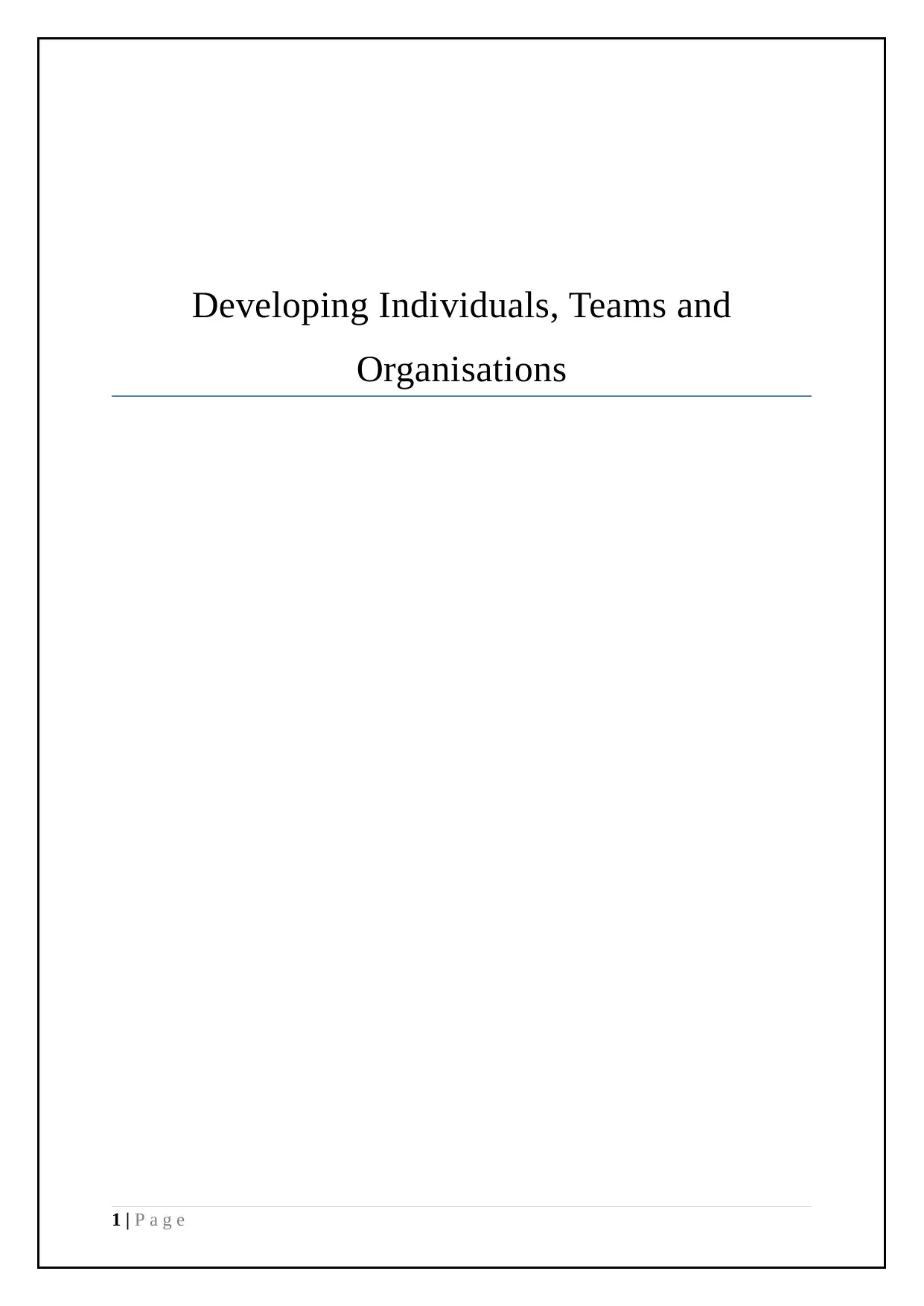
Developing Individuals, Teams and
Organisations
1 | P a g e
Organisations
1 | P a g e
Paraphrase This Document
Need a fresh take? Get an instant paraphrase of this document with our AI Paraphraser
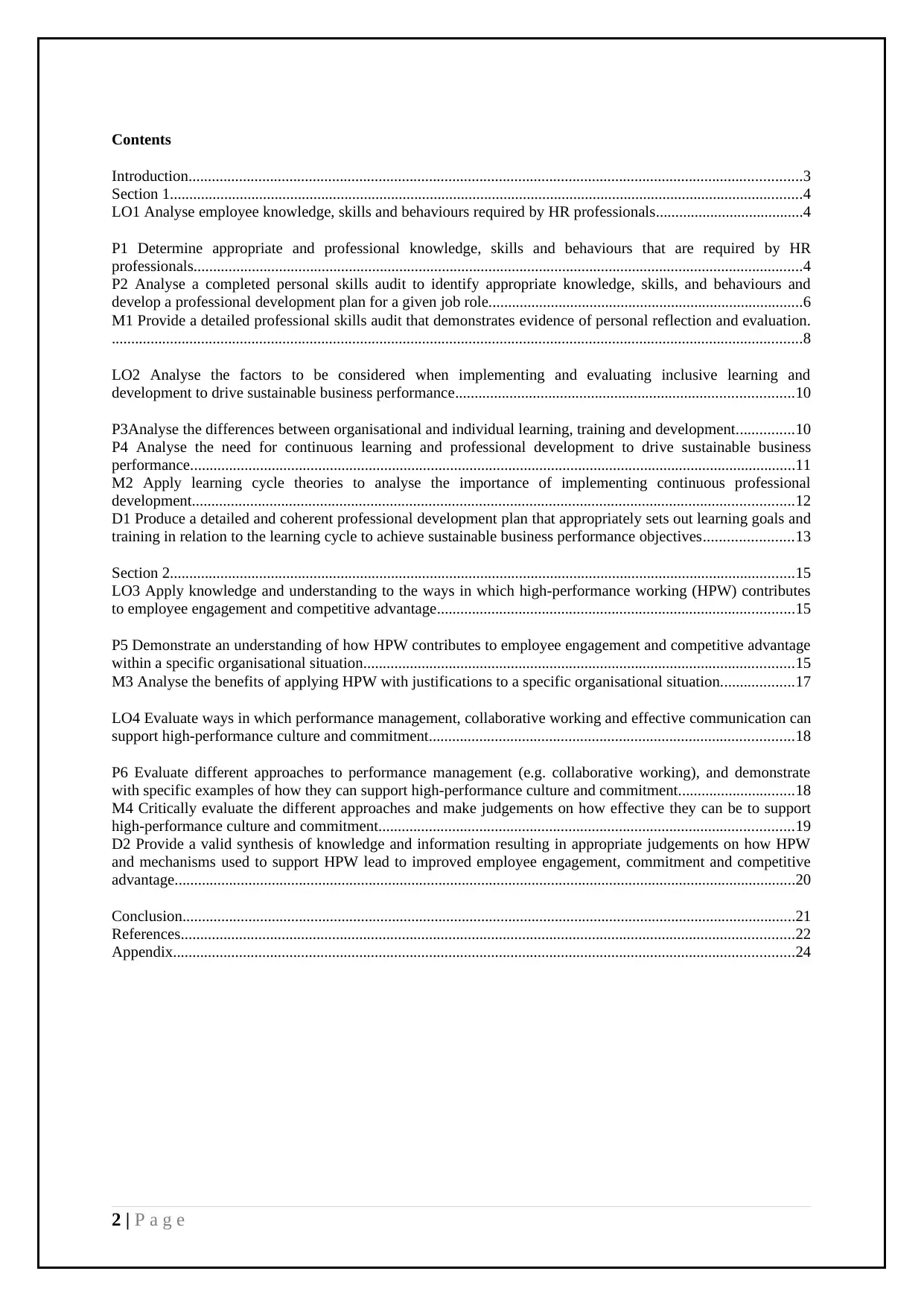
Contents
Introduction..............................................................................................................................................................3
Section 1...................................................................................................................................................................4
LO1 Analyse employee knowledge, skills and behaviours required by HR professionals......................................4
P1 Determine appropriate and professional knowledge, skills and behaviours that are required by HR
professionals.............................................................................................................................................................4
P2 Analyse a completed personal skills audit to identify appropriate knowledge, skills, and behaviours and
develop a professional development plan for a given job role.................................................................................6
M1 Provide a detailed professional skills audit that demonstrates evidence of personal reflection and evaluation.
..................................................................................................................................................................................8
LO2 Analyse the factors to be considered when implementing and evaluating inclusive learning and
development to drive sustainable business performance.......................................................................................10
P3Analyse the differences between organisational and individual learning, training and development...............10
P4 Analyse the need for continuous learning and professional development to drive sustainable business
performance............................................................................................................................................................11
M2 Apply learning cycle theories to analyse the importance of implementing continuous professional
development...........................................................................................................................................................12
D1 Produce a detailed and coherent professional development plan that appropriately sets out learning goals and
training in relation to the learning cycle to achieve sustainable business performance objectives.......................13
Section 2.................................................................................................................................................................15
LO3 Apply knowledge and understanding to the ways in which high-performance working (HPW) contributes
to employee engagement and competitive advantage............................................................................................15
P5 Demonstrate an understanding of how HPW contributes to employee engagement and competitive advantage
within a specific organisational situation...............................................................................................................15
M3 Analyse the benefits of applying HPW with justifications to a specific organisational situation...................17
LO4 Evaluate ways in which performance management, collaborative working and effective communication can
support high-performance culture and commitment..............................................................................................18
P6 Evaluate different approaches to performance management (e.g. collaborative working), and demonstrate
with specific examples of how they can support high-performance culture and commitment..............................18
M4 Critically evaluate the different approaches and make judgements on how effective they can be to support
high-performance culture and commitment...........................................................................................................19
D2 Provide a valid synthesis of knowledge and information resulting in appropriate judgements on how HPW
and mechanisms used to support HPW lead to improved employee engagement, commitment and competitive
advantage................................................................................................................................................................20
Conclusion..............................................................................................................................................................21
References..............................................................................................................................................................22
Appendix................................................................................................................................................................24
2 | P a g e
Introduction..............................................................................................................................................................3
Section 1...................................................................................................................................................................4
LO1 Analyse employee knowledge, skills and behaviours required by HR professionals......................................4
P1 Determine appropriate and professional knowledge, skills and behaviours that are required by HR
professionals.............................................................................................................................................................4
P2 Analyse a completed personal skills audit to identify appropriate knowledge, skills, and behaviours and
develop a professional development plan for a given job role.................................................................................6
M1 Provide a detailed professional skills audit that demonstrates evidence of personal reflection and evaluation.
..................................................................................................................................................................................8
LO2 Analyse the factors to be considered when implementing and evaluating inclusive learning and
development to drive sustainable business performance.......................................................................................10
P3Analyse the differences between organisational and individual learning, training and development...............10
P4 Analyse the need for continuous learning and professional development to drive sustainable business
performance............................................................................................................................................................11
M2 Apply learning cycle theories to analyse the importance of implementing continuous professional
development...........................................................................................................................................................12
D1 Produce a detailed and coherent professional development plan that appropriately sets out learning goals and
training in relation to the learning cycle to achieve sustainable business performance objectives.......................13
Section 2.................................................................................................................................................................15
LO3 Apply knowledge and understanding to the ways in which high-performance working (HPW) contributes
to employee engagement and competitive advantage............................................................................................15
P5 Demonstrate an understanding of how HPW contributes to employee engagement and competitive advantage
within a specific organisational situation...............................................................................................................15
M3 Analyse the benefits of applying HPW with justifications to a specific organisational situation...................17
LO4 Evaluate ways in which performance management, collaborative working and effective communication can
support high-performance culture and commitment..............................................................................................18
P6 Evaluate different approaches to performance management (e.g. collaborative working), and demonstrate
with specific examples of how they can support high-performance culture and commitment..............................18
M4 Critically evaluate the different approaches and make judgements on how effective they can be to support
high-performance culture and commitment...........................................................................................................19
D2 Provide a valid synthesis of knowledge and information resulting in appropriate judgements on how HPW
and mechanisms used to support HPW lead to improved employee engagement, commitment and competitive
advantage................................................................................................................................................................20
Conclusion..............................................................................................................................................................21
References..............................................................................................................................................................22
Appendix................................................................................................................................................................24
2 | P a g e
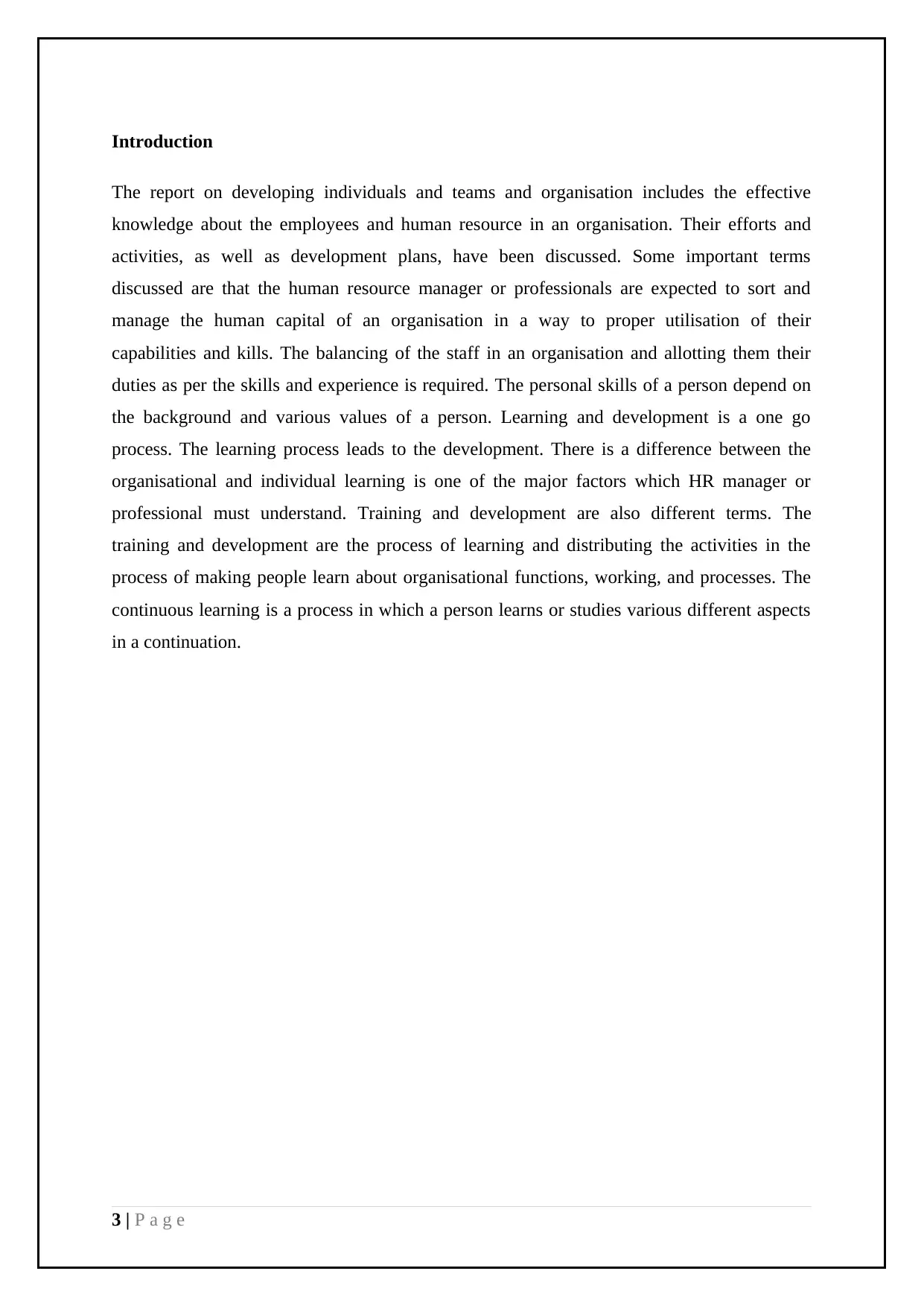
Introduction
The report on developing individuals and teams and organisation includes the effective
knowledge about the employees and human resource in an organisation. Their efforts and
activities, as well as development plans, have been discussed. Some important terms
discussed are that the human resource manager or professionals are expected to sort and
manage the human capital of an organisation in a way to proper utilisation of their
capabilities and kills. The balancing of the staff in an organisation and allotting them their
duties as per the skills and experience is required. The personal skills of a person depend on
the background and various values of a person. Learning and development is a one go
process. The learning process leads to the development. There is a difference between the
organisational and individual learning is one of the major factors which HR manager or
professional must understand. Training and development are also different terms. The
training and development are the process of learning and distributing the activities in the
process of making people learn about organisational functions, working, and processes. The
continuous learning is a process in which a person learns or studies various different aspects
in a continuation.
3 | P a g e
The report on developing individuals and teams and organisation includes the effective
knowledge about the employees and human resource in an organisation. Their efforts and
activities, as well as development plans, have been discussed. Some important terms
discussed are that the human resource manager or professionals are expected to sort and
manage the human capital of an organisation in a way to proper utilisation of their
capabilities and kills. The balancing of the staff in an organisation and allotting them their
duties as per the skills and experience is required. The personal skills of a person depend on
the background and various values of a person. Learning and development is a one go
process. The learning process leads to the development. There is a difference between the
organisational and individual learning is one of the major factors which HR manager or
professional must understand. Training and development are also different terms. The
training and development are the process of learning and distributing the activities in the
process of making people learn about organisational functions, working, and processes. The
continuous learning is a process in which a person learns or studies various different aspects
in a continuation.
3 | P a g e
⊘ This is a preview!⊘
Do you want full access?
Subscribe today to unlock all pages.

Trusted by 1+ million students worldwide
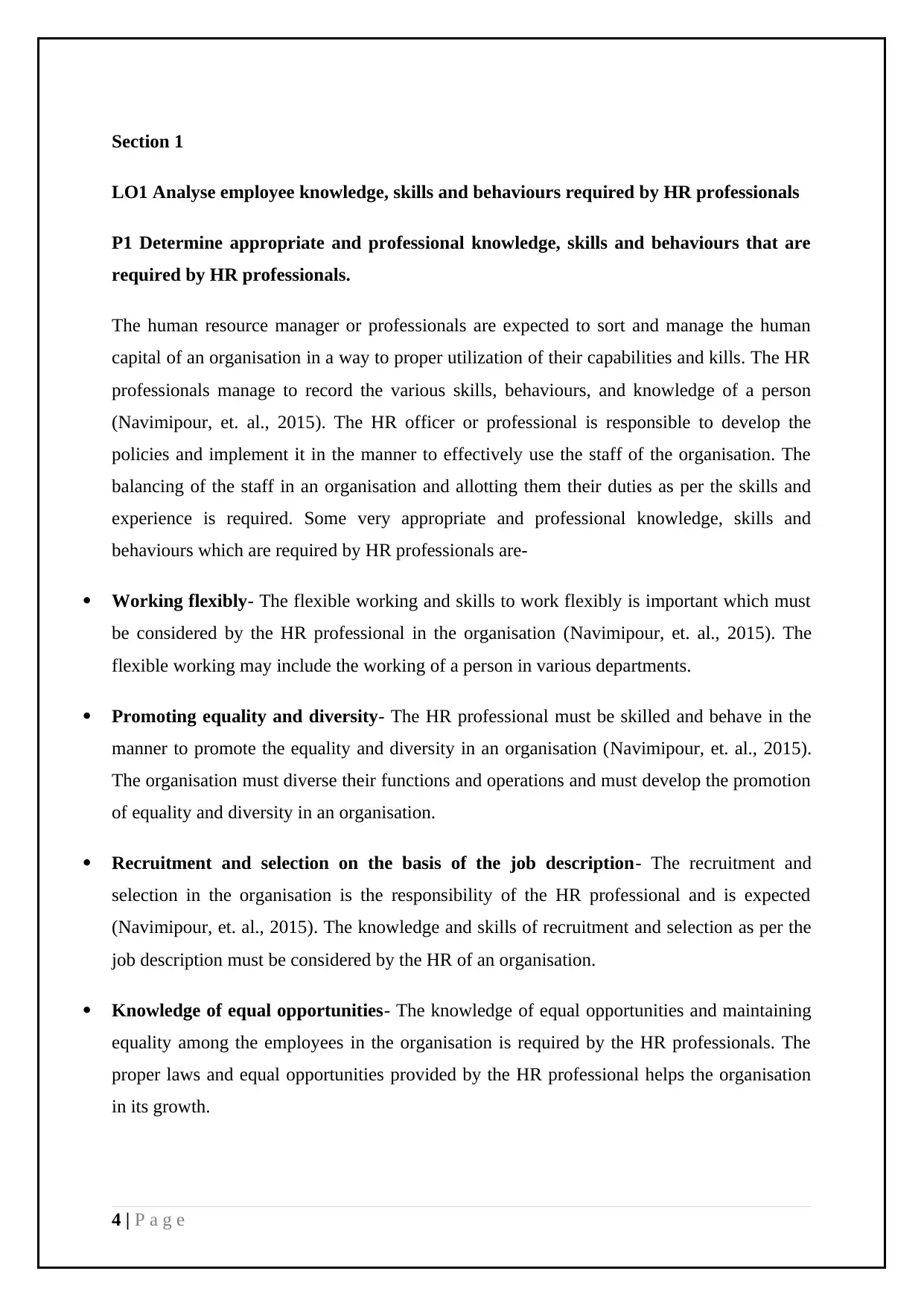
Section 1
LO1 Analyse employee knowledge, skills and behaviours required by HR professionals
P1 Determine appropriate and professional knowledge, skills and behaviours that are
required by HR professionals.
The human resource manager or professionals are expected to sort and manage the human
capital of an organisation in a way to proper utilization of their capabilities and kills. The HR
professionals manage to record the various skills, behaviours, and knowledge of a person
(Navimipour, et. al., 2015). The HR officer or professional is responsible to develop the
policies and implement it in the manner to effectively use the staff of the organisation. The
balancing of the staff in an organisation and allotting them their duties as per the skills and
experience is required. Some very appropriate and professional knowledge, skills and
behaviours which are required by HR professionals are-
Working flexibly- The flexible working and skills to work flexibly is important which must
be considered by the HR professional in the organisation (Navimipour, et. al., 2015). The
flexible working may include the working of a person in various departments.
Promoting equality and diversity- The HR professional must be skilled and behave in the
manner to promote the equality and diversity in an organisation (Navimipour, et. al., 2015).
The organisation must diverse their functions and operations and must develop the promotion
of equality and diversity in an organisation.
Recruitment and selection on the basis of the job description- The recruitment and
selection in the organisation is the responsibility of the HR professional and is expected
(Navimipour, et. al., 2015). The knowledge and skills of recruitment and selection as per the
job description must be considered by the HR of an organisation.
Knowledge of equal opportunities- The knowledge of equal opportunities and maintaining
equality among the employees in the organisation is required by the HR professionals. The
proper laws and equal opportunities provided by the HR professional helps the organisation
in its growth.
4 | P a g e
LO1 Analyse employee knowledge, skills and behaviours required by HR professionals
P1 Determine appropriate and professional knowledge, skills and behaviours that are
required by HR professionals.
The human resource manager or professionals are expected to sort and manage the human
capital of an organisation in a way to proper utilization of their capabilities and kills. The HR
professionals manage to record the various skills, behaviours, and knowledge of a person
(Navimipour, et. al., 2015). The HR officer or professional is responsible to develop the
policies and implement it in the manner to effectively use the staff of the organisation. The
balancing of the staff in an organisation and allotting them their duties as per the skills and
experience is required. Some very appropriate and professional knowledge, skills and
behaviours which are required by HR professionals are-
Working flexibly- The flexible working and skills to work flexibly is important which must
be considered by the HR professional in the organisation (Navimipour, et. al., 2015). The
flexible working may include the working of a person in various departments.
Promoting equality and diversity- The HR professional must be skilled and behave in the
manner to promote the equality and diversity in an organisation (Navimipour, et. al., 2015).
The organisation must diverse their functions and operations and must develop the promotion
of equality and diversity in an organisation.
Recruitment and selection on the basis of the job description- The recruitment and
selection in the organisation is the responsibility of the HR professional and is expected
(Navimipour, et. al., 2015). The knowledge and skills of recruitment and selection as per the
job description must be considered by the HR of an organisation.
Knowledge of equal opportunities- The knowledge of equal opportunities and maintaining
equality among the employees in the organisation is required by the HR professionals. The
proper laws and equal opportunities provided by the HR professional helps the organisation
in its growth.
4 | P a g e
Paraphrase This Document
Need a fresh take? Get an instant paraphrase of this document with our AI Paraphraser
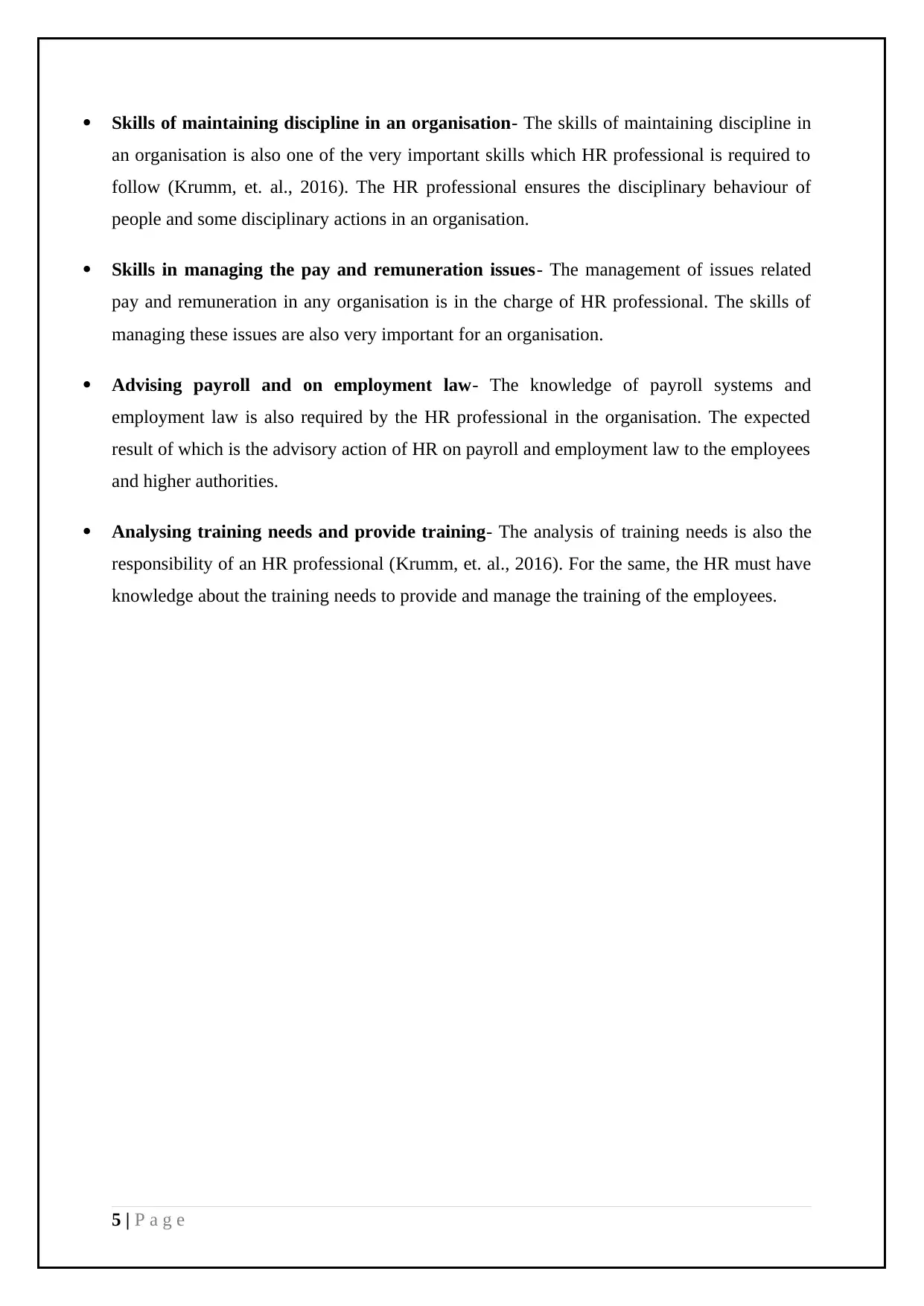
Skills of maintaining discipline in an organisation- The skills of maintaining discipline in
an organisation is also one of the very important skills which HR professional is required to
follow (Krumm, et. al., 2016). The HR professional ensures the disciplinary behaviour of
people and some disciplinary actions in an organisation.
Skills in managing the pay and remuneration issues- The management of issues related
pay and remuneration in any organisation is in the charge of HR professional. The skills of
managing these issues are also very important for an organisation.
Advising payroll and on employment law- The knowledge of payroll systems and
employment law is also required by the HR professional in the organisation. The expected
result of which is the advisory action of HR on payroll and employment law to the employees
and higher authorities.
Analysing training needs and provide training- The analysis of training needs is also the
responsibility of an HR professional (Krumm, et. al., 2016). For the same, the HR must have
knowledge about the training needs to provide and manage the training of the employees.
5 | P a g e
an organisation is also one of the very important skills which HR professional is required to
follow (Krumm, et. al., 2016). The HR professional ensures the disciplinary behaviour of
people and some disciplinary actions in an organisation.
Skills in managing the pay and remuneration issues- The management of issues related
pay and remuneration in any organisation is in the charge of HR professional. The skills of
managing these issues are also very important for an organisation.
Advising payroll and on employment law- The knowledge of payroll systems and
employment law is also required by the HR professional in the organisation. The expected
result of which is the advisory action of HR on payroll and employment law to the employees
and higher authorities.
Analysing training needs and provide training- The analysis of training needs is also the
responsibility of an HR professional (Krumm, et. al., 2016). For the same, the HR must have
knowledge about the training needs to provide and manage the training of the employees.
5 | P a g e
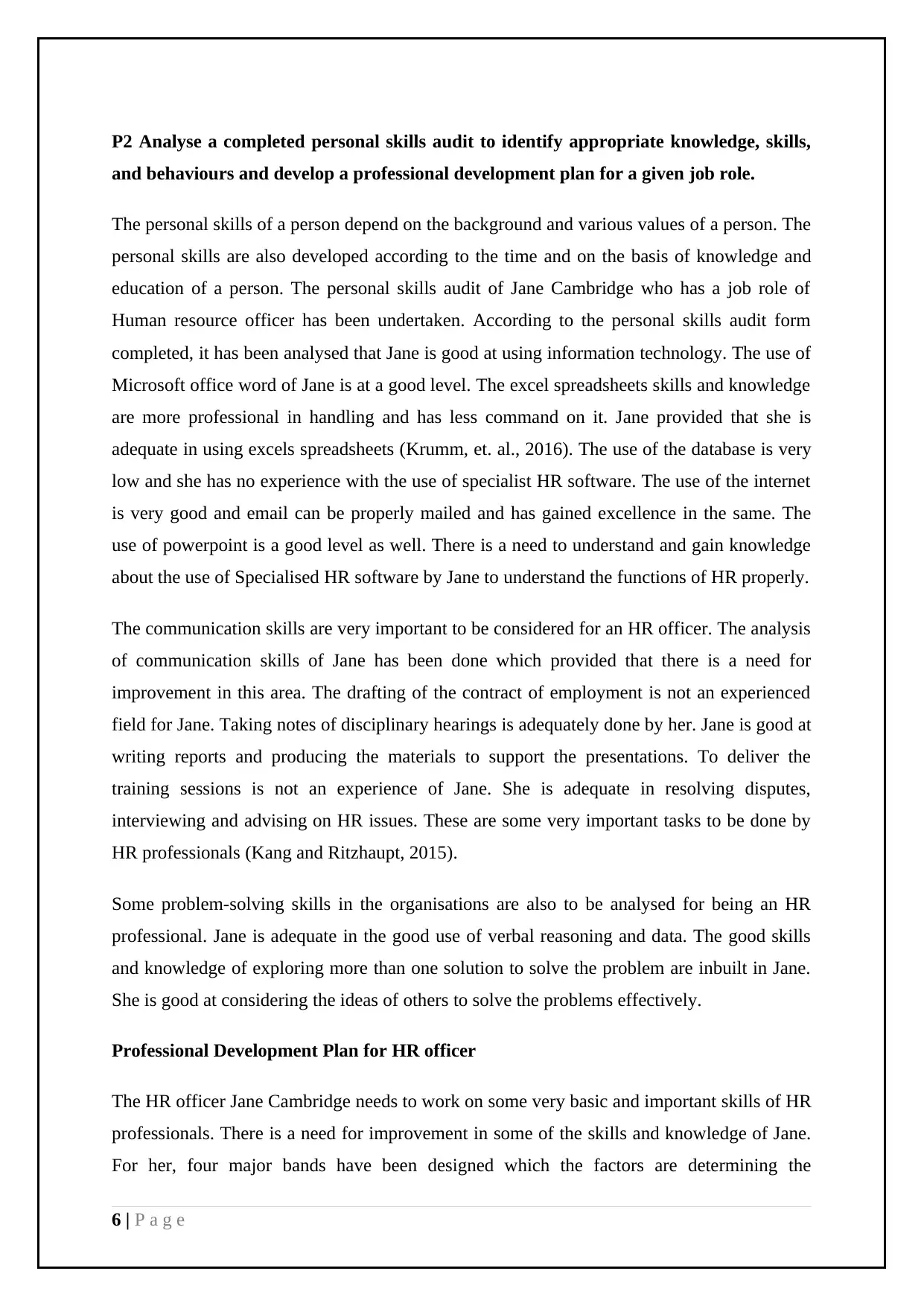
P2 Analyse a completed personal skills audit to identify appropriate knowledge, skills,
and behaviours and develop a professional development plan for a given job role.
The personal skills of a person depend on the background and various values of a person. The
personal skills are also developed according to the time and on the basis of knowledge and
education of a person. The personal skills audit of Jane Cambridge who has a job role of
Human resource officer has been undertaken. According to the personal skills audit form
completed, it has been analysed that Jane is good at using information technology. The use of
Microsoft office word of Jane is at a good level. The excel spreadsheets skills and knowledge
are more professional in handling and has less command on it. Jane provided that she is
adequate in using excels spreadsheets (Krumm, et. al., 2016). The use of the database is very
low and she has no experience with the use of specialist HR software. The use of the internet
is very good and email can be properly mailed and has gained excellence in the same. The
use of powerpoint is a good level as well. There is a need to understand and gain knowledge
about the use of Specialised HR software by Jane to understand the functions of HR properly.
The communication skills are very important to be considered for an HR officer. The analysis
of communication skills of Jane has been done which provided that there is a need for
improvement in this area. The drafting of the contract of employment is not an experienced
field for Jane. Taking notes of disciplinary hearings is adequately done by her. Jane is good at
writing reports and producing the materials to support the presentations. To deliver the
training sessions is not an experience of Jane. She is adequate in resolving disputes,
interviewing and advising on HR issues. These are some very important tasks to be done by
HR professionals (Kang and Ritzhaupt, 2015).
Some problem-solving skills in the organisations are also to be analysed for being an HR
professional. Jane is adequate in the good use of verbal reasoning and data. The good skills
and knowledge of exploring more than one solution to solve the problem are inbuilt in Jane.
She is good at considering the ideas of others to solve the problems effectively.
Professional Development Plan for HR officer
The HR officer Jane Cambridge needs to work on some very basic and important skills of HR
professionals. There is a need for improvement in some of the skills and knowledge of Jane.
For her, four major bands have been designed which the factors are determining the
6 | P a g e
and behaviours and develop a professional development plan for a given job role.
The personal skills of a person depend on the background and various values of a person. The
personal skills are also developed according to the time and on the basis of knowledge and
education of a person. The personal skills audit of Jane Cambridge who has a job role of
Human resource officer has been undertaken. According to the personal skills audit form
completed, it has been analysed that Jane is good at using information technology. The use of
Microsoft office word of Jane is at a good level. The excel spreadsheets skills and knowledge
are more professional in handling and has less command on it. Jane provided that she is
adequate in using excels spreadsheets (Krumm, et. al., 2016). The use of the database is very
low and she has no experience with the use of specialist HR software. The use of the internet
is very good and email can be properly mailed and has gained excellence in the same. The
use of powerpoint is a good level as well. There is a need to understand and gain knowledge
about the use of Specialised HR software by Jane to understand the functions of HR properly.
The communication skills are very important to be considered for an HR officer. The analysis
of communication skills of Jane has been done which provided that there is a need for
improvement in this area. The drafting of the contract of employment is not an experienced
field for Jane. Taking notes of disciplinary hearings is adequately done by her. Jane is good at
writing reports and producing the materials to support the presentations. To deliver the
training sessions is not an experience of Jane. She is adequate in resolving disputes,
interviewing and advising on HR issues. These are some very important tasks to be done by
HR professionals (Kang and Ritzhaupt, 2015).
Some problem-solving skills in the organisations are also to be analysed for being an HR
professional. Jane is adequate in the good use of verbal reasoning and data. The good skills
and knowledge of exploring more than one solution to solve the problem are inbuilt in Jane.
She is good at considering the ideas of others to solve the problems effectively.
Professional Development Plan for HR officer
The HR officer Jane Cambridge needs to work on some very basic and important skills of HR
professionals. There is a need for improvement in some of the skills and knowledge of Jane.
For her, four major bands have been designed which the factors are determining the
6 | P a g e
⊘ This is a preview!⊘
Do you want full access?
Subscribe today to unlock all pages.

Trusted by 1+ million students worldwide
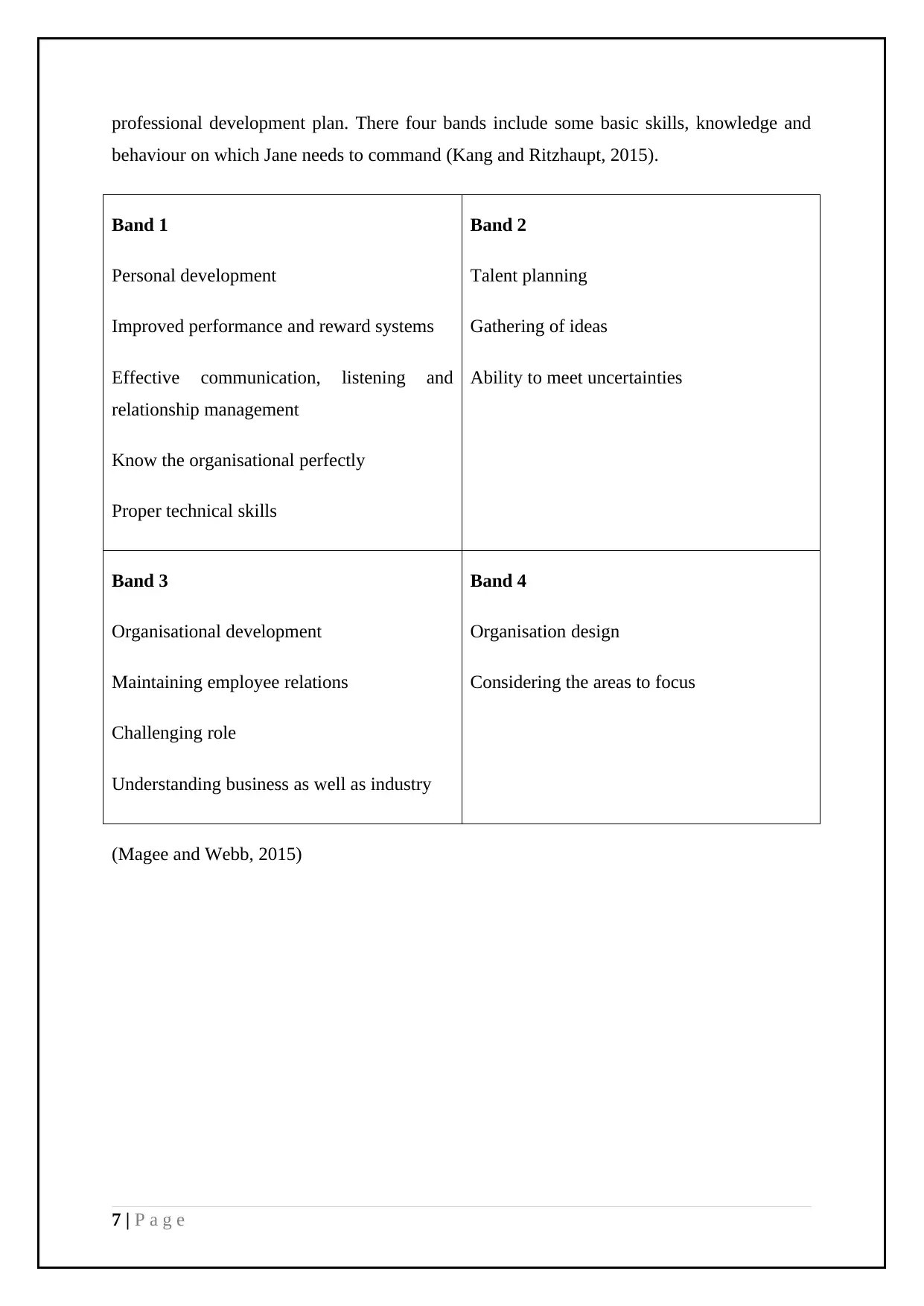
professional development plan. There four bands include some basic skills, knowledge and
behaviour on which Jane needs to command (Kang and Ritzhaupt, 2015).
Band 1
Personal development
Improved performance and reward systems
Effective communication, listening and
relationship management
Know the organisational perfectly
Proper technical skills
Band 2
Talent planning
Gathering of ideas
Ability to meet uncertainties
Band 3
Organisational development
Maintaining employee relations
Challenging role
Understanding business as well as industry
Band 4
Organisation design
Considering the areas to focus
(Magee and Webb, 2015)
7 | P a g e
behaviour on which Jane needs to command (Kang and Ritzhaupt, 2015).
Band 1
Personal development
Improved performance and reward systems
Effective communication, listening and
relationship management
Know the organisational perfectly
Proper technical skills
Band 2
Talent planning
Gathering of ideas
Ability to meet uncertainties
Band 3
Organisational development
Maintaining employee relations
Challenging role
Understanding business as well as industry
Band 4
Organisation design
Considering the areas to focus
(Magee and Webb, 2015)
7 | P a g e
Paraphrase This Document
Need a fresh take? Get an instant paraphrase of this document with our AI Paraphraser
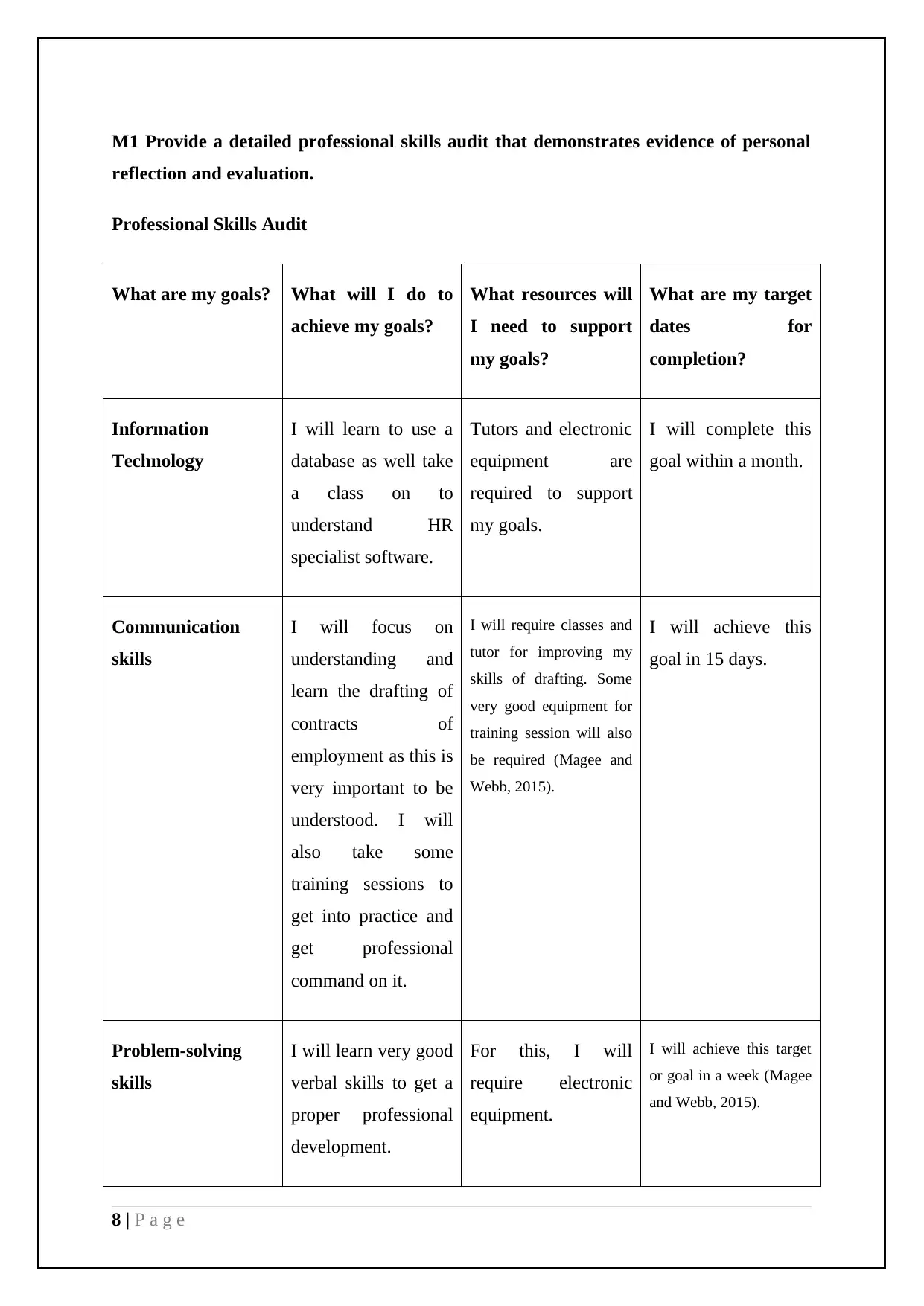
M1 Provide a detailed professional skills audit that demonstrates evidence of personal
reflection and evaluation.
Professional Skills Audit
What are my goals? What will I do to
achieve my goals?
What resources will
I need to support
my goals?
What are my target
dates for
completion?
Information
Technology
I will learn to use a
database as well take
a class on to
understand HR
specialist software.
Tutors and electronic
equipment are
required to support
my goals.
I will complete this
goal within a month.
Communication
skills
I will focus on
understanding and
learn the drafting of
contracts of
employment as this is
very important to be
understood. I will
also take some
training sessions to
get into practice and
get professional
command on it.
I will require classes and
tutor for improving my
skills of drafting. Some
very good equipment for
training session will also
be required (Magee and
Webb, 2015).
I will achieve this
goal in 15 days.
Problem-solving
skills
I will learn very good
verbal skills to get a
proper professional
development.
For this, I will
require electronic
equipment.
I will achieve this target
or goal in a week (Magee
and Webb, 2015).
8 | P a g e
reflection and evaluation.
Professional Skills Audit
What are my goals? What will I do to
achieve my goals?
What resources will
I need to support
my goals?
What are my target
dates for
completion?
Information
Technology
I will learn to use a
database as well take
a class on to
understand HR
specialist software.
Tutors and electronic
equipment are
required to support
my goals.
I will complete this
goal within a month.
Communication
skills
I will focus on
understanding and
learn the drafting of
contracts of
employment as this is
very important to be
understood. I will
also take some
training sessions to
get into practice and
get professional
command on it.
I will require classes and
tutor for improving my
skills of drafting. Some
very good equipment for
training session will also
be required (Magee and
Webb, 2015).
I will achieve this
goal in 15 days.
Problem-solving
skills
I will learn very good
verbal skills to get a
proper professional
development.
For this, I will
require electronic
equipment.
I will achieve this target
or goal in a week (Magee
and Webb, 2015).
8 | P a g e
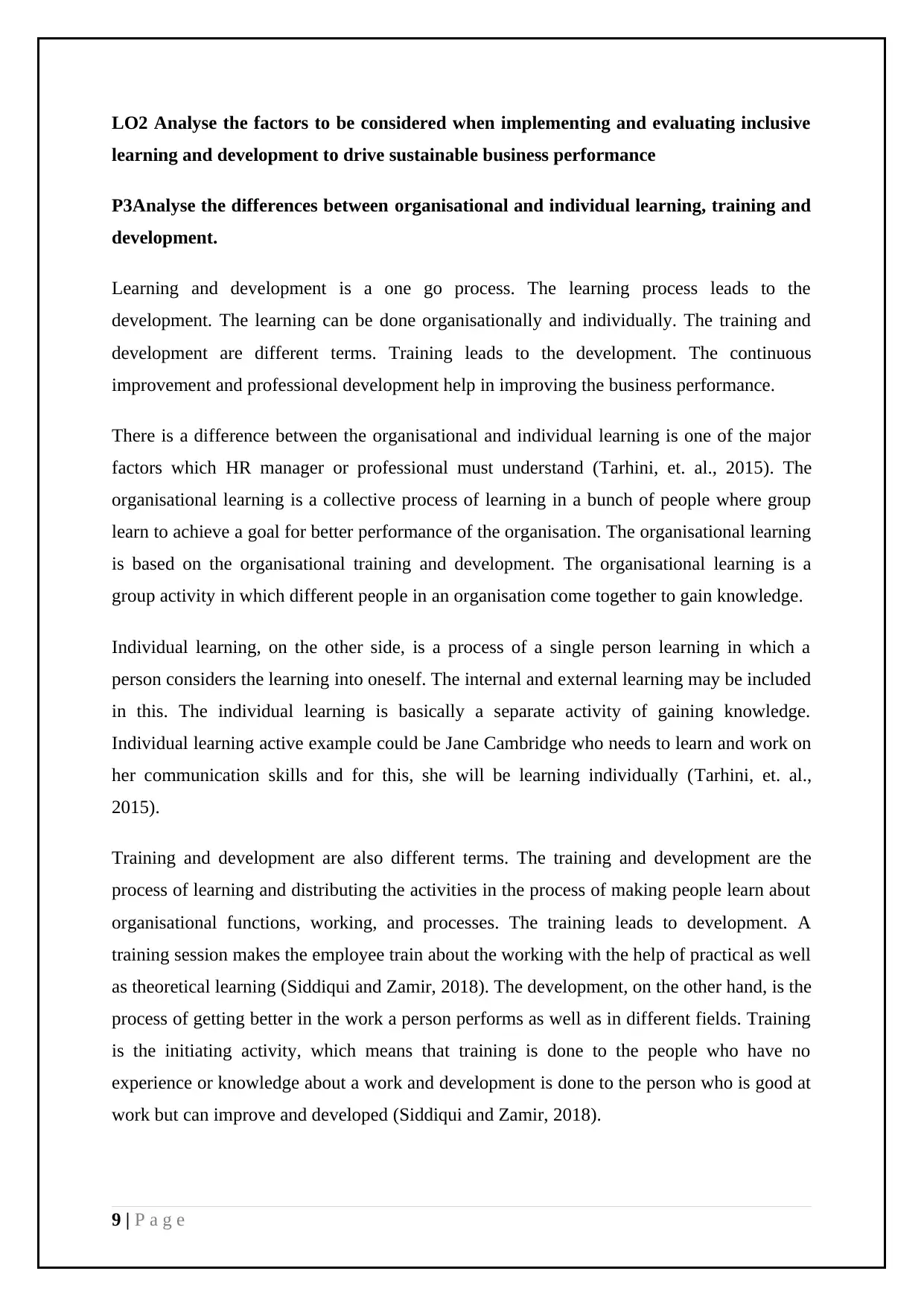
LO2 Analyse the factors to be considered when implementing and evaluating inclusive
learning and development to drive sustainable business performance
P3Analyse the differences between organisational and individual learning, training and
development.
Learning and development is a one go process. The learning process leads to the
development. The learning can be done organisationally and individually. The training and
development are different terms. Training leads to the development. The continuous
improvement and professional development help in improving the business performance.
There is a difference between the organisational and individual learning is one of the major
factors which HR manager or professional must understand (Tarhini, et. al., 2015). The
organisational learning is a collective process of learning in a bunch of people where group
learn to achieve a goal for better performance of the organisation. The organisational learning
is based on the organisational training and development. The organisational learning is a
group activity in which different people in an organisation come together to gain knowledge.
Individual learning, on the other side, is a process of a single person learning in which a
person considers the learning into oneself. The internal and external learning may be included
in this. The individual learning is basically a separate activity of gaining knowledge.
Individual learning active example could be Jane Cambridge who needs to learn and work on
her communication skills and for this, she will be learning individually (Tarhini, et. al.,
2015).
Training and development are also different terms. The training and development are the
process of learning and distributing the activities in the process of making people learn about
organisational functions, working, and processes. The training leads to development. A
training session makes the employee train about the working with the help of practical as well
as theoretical learning (Siddiqui and Zamir, 2018). The development, on the other hand, is the
process of getting better in the work a person performs as well as in different fields. Training
is the initiating activity, which means that training is done to the people who have no
experience or knowledge about a work and development is done to the person who is good at
work but can improve and developed (Siddiqui and Zamir, 2018).
9 | P a g e
learning and development to drive sustainable business performance
P3Analyse the differences between organisational and individual learning, training and
development.
Learning and development is a one go process. The learning process leads to the
development. The learning can be done organisationally and individually. The training and
development are different terms. Training leads to the development. The continuous
improvement and professional development help in improving the business performance.
There is a difference between the organisational and individual learning is one of the major
factors which HR manager or professional must understand (Tarhini, et. al., 2015). The
organisational learning is a collective process of learning in a bunch of people where group
learn to achieve a goal for better performance of the organisation. The organisational learning
is based on the organisational training and development. The organisational learning is a
group activity in which different people in an organisation come together to gain knowledge.
Individual learning, on the other side, is a process of a single person learning in which a
person considers the learning into oneself. The internal and external learning may be included
in this. The individual learning is basically a separate activity of gaining knowledge.
Individual learning active example could be Jane Cambridge who needs to learn and work on
her communication skills and for this, she will be learning individually (Tarhini, et. al.,
2015).
Training and development are also different terms. The training and development are the
process of learning and distributing the activities in the process of making people learn about
organisational functions, working, and processes. The training leads to development. A
training session makes the employee train about the working with the help of practical as well
as theoretical learning (Siddiqui and Zamir, 2018). The development, on the other hand, is the
process of getting better in the work a person performs as well as in different fields. Training
is the initiating activity, which means that training is done to the people who have no
experience or knowledge about a work and development is done to the person who is good at
work but can improve and developed (Siddiqui and Zamir, 2018).
9 | P a g e
⊘ This is a preview!⊘
Do you want full access?
Subscribe today to unlock all pages.

Trusted by 1+ million students worldwide
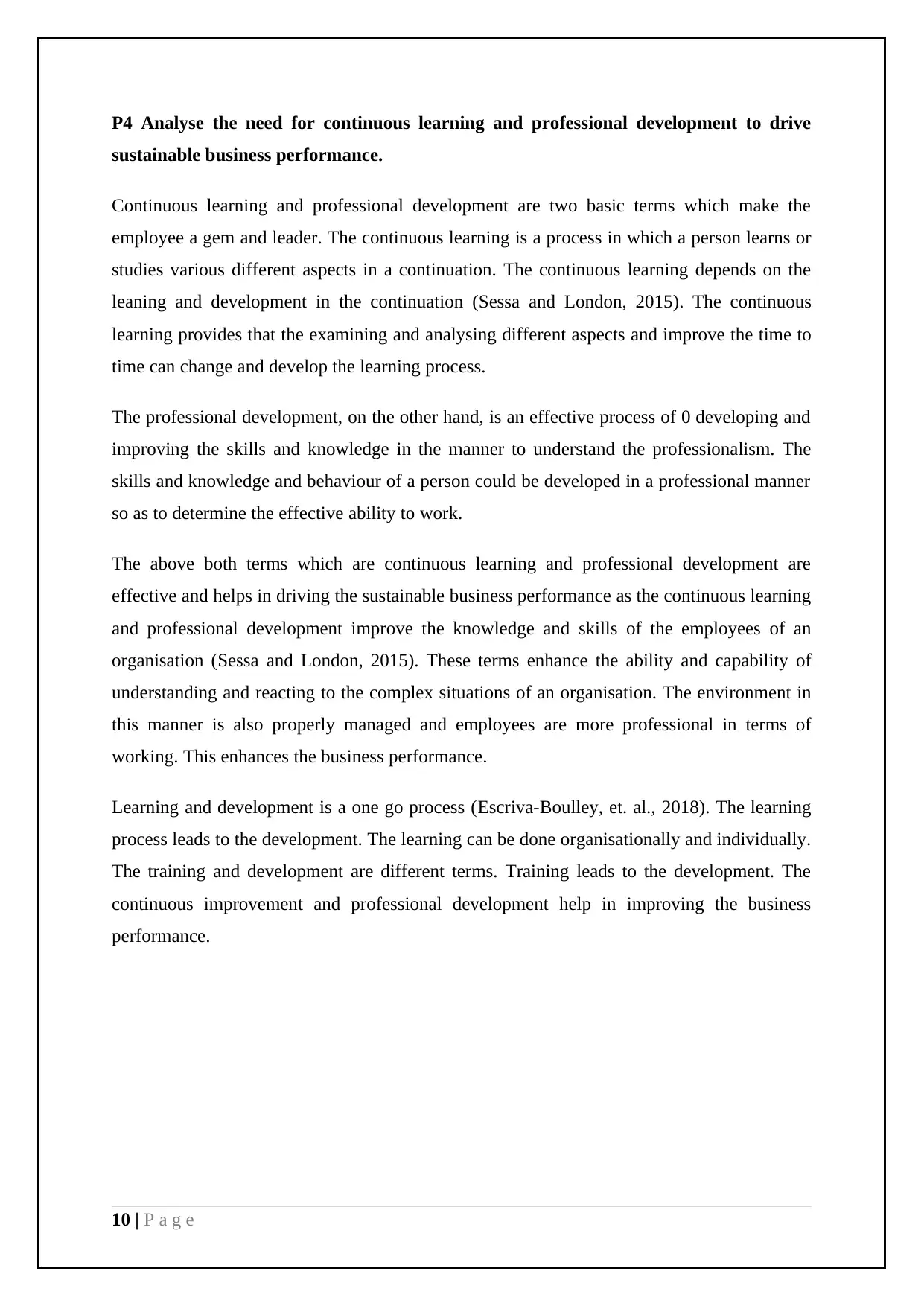
P4 Analyse the need for continuous learning and professional development to drive
sustainable business performance.
Continuous learning and professional development are two basic terms which make the
employee a gem and leader. The continuous learning is a process in which a person learns or
studies various different aspects in a continuation. The continuous learning depends on the
leaning and development in the continuation (Sessa and London, 2015). The continuous
learning provides that the examining and analysing different aspects and improve the time to
time can change and develop the learning process.
The professional development, on the other hand, is an effective process of 0 developing and
improving the skills and knowledge in the manner to understand the professionalism. The
skills and knowledge and behaviour of a person could be developed in a professional manner
so as to determine the effective ability to work.
The above both terms which are continuous learning and professional development are
effective and helps in driving the sustainable business performance as the continuous learning
and professional development improve the knowledge and skills of the employees of an
organisation (Sessa and London, 2015). These terms enhance the ability and capability of
understanding and reacting to the complex situations of an organisation. The environment in
this manner is also properly managed and employees are more professional in terms of
working. This enhances the business performance.
Learning and development is a one go process (Escriva-Boulley, et. al., 2018). The learning
process leads to the development. The learning can be done organisationally and individually.
The training and development are different terms. Training leads to the development. The
continuous improvement and professional development help in improving the business
performance.
10 | P a g e
sustainable business performance.
Continuous learning and professional development are two basic terms which make the
employee a gem and leader. The continuous learning is a process in which a person learns or
studies various different aspects in a continuation. The continuous learning depends on the
leaning and development in the continuation (Sessa and London, 2015). The continuous
learning provides that the examining and analysing different aspects and improve the time to
time can change and develop the learning process.
The professional development, on the other hand, is an effective process of 0 developing and
improving the skills and knowledge in the manner to understand the professionalism. The
skills and knowledge and behaviour of a person could be developed in a professional manner
so as to determine the effective ability to work.
The above both terms which are continuous learning and professional development are
effective and helps in driving the sustainable business performance as the continuous learning
and professional development improve the knowledge and skills of the employees of an
organisation (Sessa and London, 2015). These terms enhance the ability and capability of
understanding and reacting to the complex situations of an organisation. The environment in
this manner is also properly managed and employees are more professional in terms of
working. This enhances the business performance.
Learning and development is a one go process (Escriva-Boulley, et. al., 2018). The learning
process leads to the development. The learning can be done organisationally and individually.
The training and development are different terms. Training leads to the development. The
continuous improvement and professional development help in improving the business
performance.
10 | P a g e
Paraphrase This Document
Need a fresh take? Get an instant paraphrase of this document with our AI Paraphraser
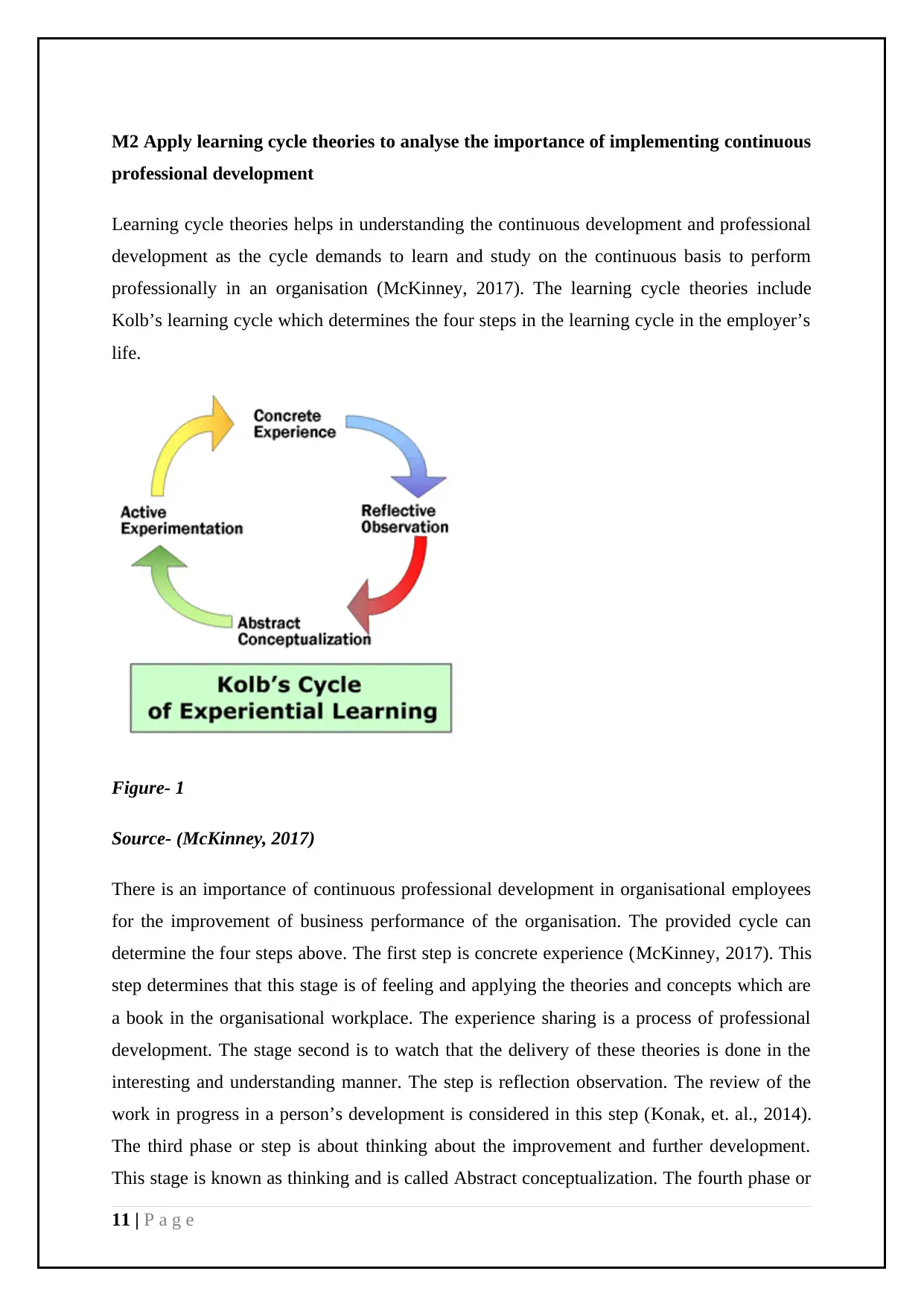
M2 Apply learning cycle theories to analyse the importance of implementing continuous
professional development
Learning cycle theories helps in understanding the continuous development and professional
development as the cycle demands to learn and study on the continuous basis to perform
professionally in an organisation (McKinney, 2017). The learning cycle theories include
Kolb’s learning cycle which determines the four steps in the learning cycle in the employer’s
life.
Figure- 1
Source- (McKinney, 2017)
There is an importance of continuous professional development in organisational employees
for the improvement of business performance of the organisation. The provided cycle can
determine the four steps above. The first step is concrete experience (McKinney, 2017). This
step determines that this stage is of feeling and applying the theories and concepts which are
a book in the organisational workplace. The experience sharing is a process of professional
development. The stage second is to watch that the delivery of these theories is done in the
interesting and understanding manner. The step is reflection observation. The review of the
work in progress in a person’s development is considered in this step (Konak, et. al., 2014).
The third phase or step is about thinking about the improvement and further development.
This stage is known as thinking and is called Abstract conceptualization. The fourth phase or
11 | P a g e
professional development
Learning cycle theories helps in understanding the continuous development and professional
development as the cycle demands to learn and study on the continuous basis to perform
professionally in an organisation (McKinney, 2017). The learning cycle theories include
Kolb’s learning cycle which determines the four steps in the learning cycle in the employer’s
life.
Figure- 1
Source- (McKinney, 2017)
There is an importance of continuous professional development in organisational employees
for the improvement of business performance of the organisation. The provided cycle can
determine the four steps above. The first step is concrete experience (McKinney, 2017). This
step determines that this stage is of feeling and applying the theories and concepts which are
a book in the organisational workplace. The experience sharing is a process of professional
development. The stage second is to watch that the delivery of these theories is done in the
interesting and understanding manner. The step is reflection observation. The review of the
work in progress in a person’s development is considered in this step (Konak, et. al., 2014).
The third phase or step is about thinking about the improvement and further development.
This stage is known as thinking and is called Abstract conceptualization. The fourth phase or
11 | P a g e
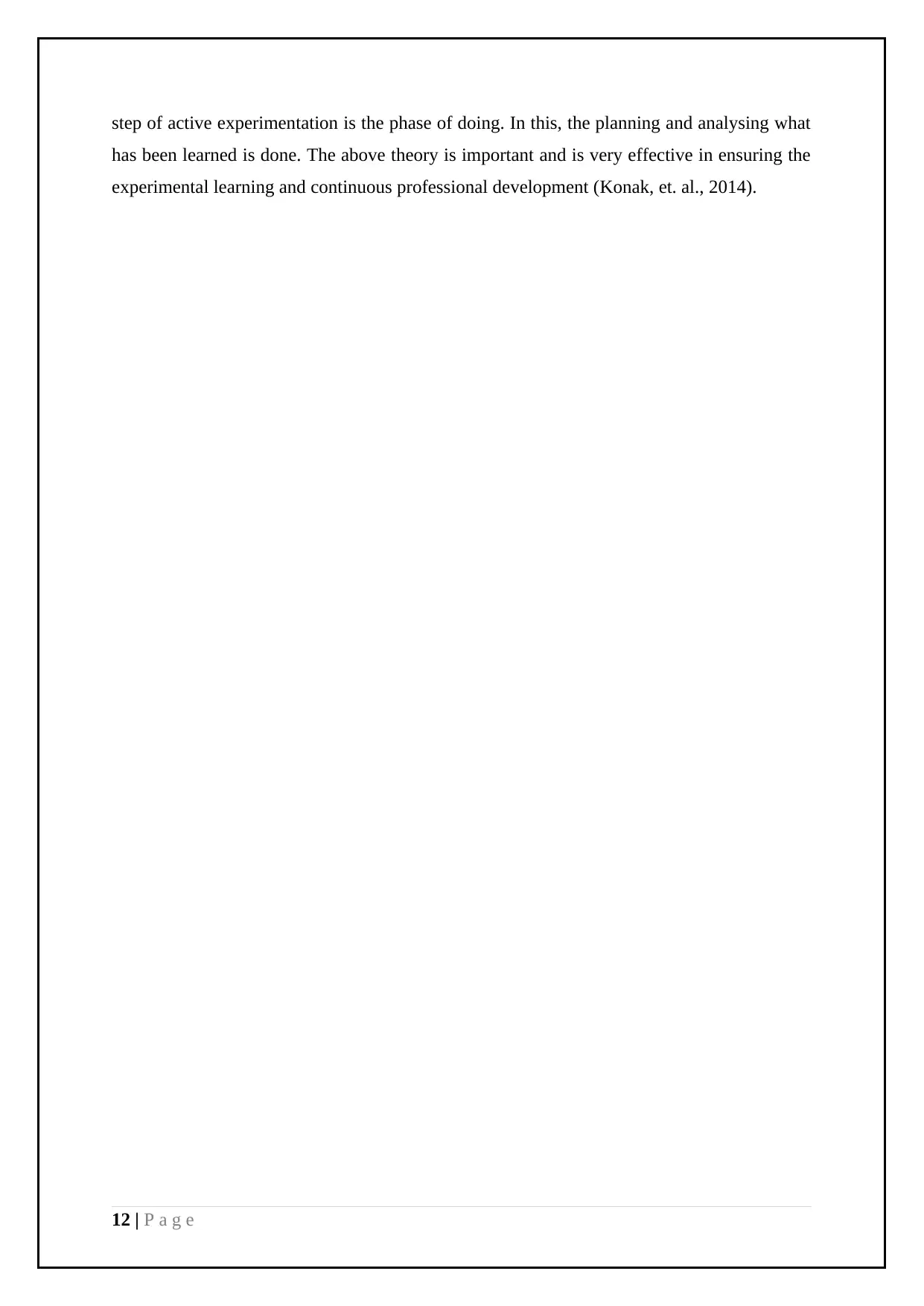
step of active experimentation is the phase of doing. In this, the planning and analysing what
has been learned is done. The above theory is important and is very effective in ensuring the
experimental learning and continuous professional development (Konak, et. al., 2014).
12 | P a g e
has been learned is done. The above theory is important and is very effective in ensuring the
experimental learning and continuous professional development (Konak, et. al., 2014).
12 | P a g e
⊘ This is a preview!⊘
Do you want full access?
Subscribe today to unlock all pages.

Trusted by 1+ million students worldwide
1 out of 27
Related Documents
Your All-in-One AI-Powered Toolkit for Academic Success.
+13062052269
info@desklib.com
Available 24*7 on WhatsApp / Email
![[object Object]](/_next/static/media/star-bottom.7253800d.svg)
Unlock your academic potential
Copyright © 2020–2026 A2Z Services. All Rights Reserved. Developed and managed by ZUCOL.

